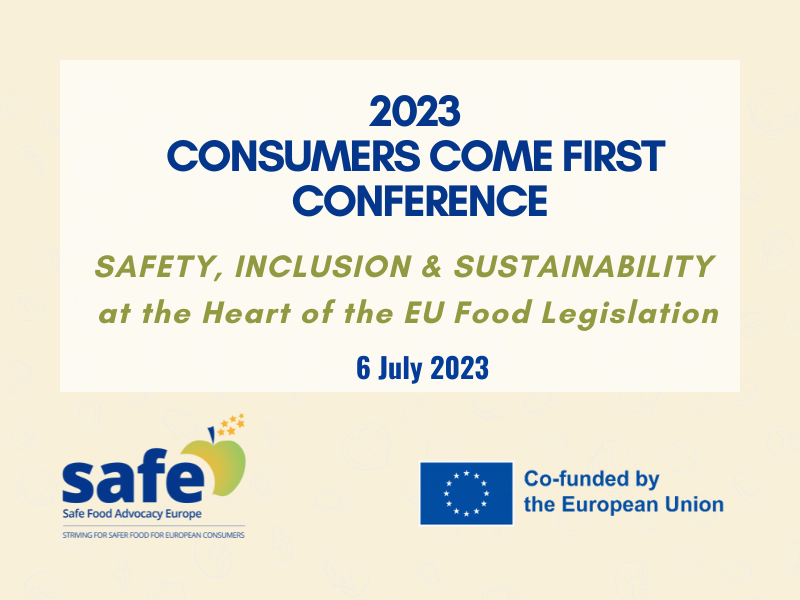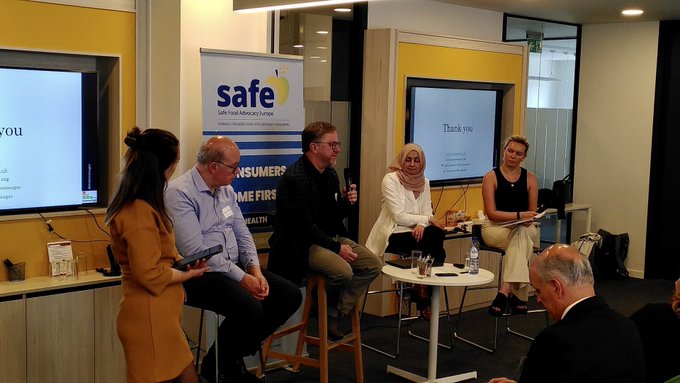A FEW TAKEAWAYS FROM SAFE’S 2023 CONSUMERS COME FIRST CONFERENCE
07 July 2023

SAFE’s 2023 Consumers Come First conference brought together stakeholders and representatives of the EU institutions, who debated on how to protect the environment and citizens’ health, empowering consumers to make informed choices. The conference was also the occasion to present SAFE’s EU Elections 2024 Manifesto, which outlined the organisation’s vision and key priorities for healthier, more sustainable, and inclusive food systems.
#ConsumersComeFirst!
On July 6, 2023, SAFE Food Advocacy Europe’s 2023 Consumers Come First conference united stakeholders and EU Institution representatives to address critical issues in the food sector. Themed “Safety, Inclusion & Sustainability at the Heart of the EU Food Legislation,” the conference delved into the European Union’s efficacy in safeguarding consumers’ health and empowering them to make informed food choices. Discussions shed light on the efforts made by regulatory bodies, organisations, and governments in Europe to ensure consumer well-being. Emphasising continuous dialogue, research, and awareness campaigns, the event aimed to tackle emerging challenges in the food industry and advocate for better food practices to foster a healthier society.
The conference spotlighted the European Commission’s flagship initiatives, including the revision of the Farm to Fork Strategy and the legislative Framework for Sustainable Food Systems. Health and inclusion of vulnerable consumer groups were underscored as crucial aspects for future EU food policies.
During the conference, SAFE presented its EU Elections 2024 Manifesto, outlining the organisation’s vision and key priorities for fostering healthier, more sustainable, and inclusive food systems, and aimed to influence EU policy and decision-makers in the run-up to the 2024 EU Elections.
Keynote opening speech by MEP Francisco Guerreiro highlighted the flaws of our current food system at every level, and the need for responsible decision-making, helping citizens make conscious decisions, and benefiting consumers, farmers, fishermen, and communities. He stressed that debates on food safety and sustainability are crucial ahead of the EU Elections and that citizens must have a say in their food choices and be informed and engaged. To this end, he added, SAFE’s Manifesto is an important tool to pressure the political parties.
Floriana Cimmarusti, Secretary General of SAFE Food Advocacy Europe, introduced the organisation’s mission, highlighting its commitment to protecting citizens during the EU food legislation process and working in three interrelated areas: health, sustainability, inclusion. She briefly presented the programme of the conference, touching upon issues of food safety, sustainability and inclusion of disadvantaged populations, finally mentioning SAFE’s 2024 EU Elections Manifesto.
As a proud member of the Board of EFSA, Cimmarusti always emphasises the food safety aspects that could be improved and dealt with earlier. Examples include the additive E171 – that was approved in 2008 and banned only in 2021 -, bisphenol A (that was considered with no health risks in 2015 and the maximum level of which was reduced to 20 000 times lower in 2023), as well as sugar.
On the aspect of food inclusion, the Secretary General highlighted the importance of equal distribution of food, tackling food waste and inflation, and called on the upcoming SFS law to deliver on health and social fairness. She wrapped up by stating that timing and science certainty are some of the most important aspects for consumers and food manufacturers, and that SAFE stands ready to work altogether to advance on these issues.
Madeleine Coste, Food Policy Officer of Slow Food Europe, presented the global organisation’s efforts to advocate for sustainable food systems. She continued on the involvement of Slow Food as part of the EU Food policy coalition which gathers 50 organisations, presenting the coalition’s common vision for sustainable food systems, calling for policy coherence, not made in silos. Coste emphasised the importance of the upcoming SFS law in developing integrated food policies from production to consumption levels. She presented the Policy report of the EU Food Policy Coalition, which recommended a food system approach, a new governance framework, enabling food environments, and strong accountability and fairness throughout the food chain.

.
In the following panel session, Bruno Gautrais, Head of Unit E2 (Food processing technologies and novel foods) of DG SANTE at the European Commission, addressed the challenges and opportunities related to novel foods within the EU. As food diversity and biodiversity losses increase, there is a growing need to explore new food sources. However, questions about the safety, cultural implications, and ethical considerations of these novel foods arise. To address these concerns, the EU has established a regulatory framework (Regulation (EU) 2015/2283) for novel foods, which ensures a high level of protection for human health and consumer interests. Gautrais stressed that while the regulatory framework primarily focuses on safety, it also considers transparency and information provision to consumers. Stakeholders, including civil society, businesses, and regulators, all have specific expectations that need to be addressed in the authorisation process.
Frans Verstraete, Official in the same Unity of DG SANTE, presented the EU’s policy on acrylamide in food, a genotoxic carcinogenic substance. The European Food Safety Authority (EFSA) has expressed concerns about dietary exposure to acrylamide, which is primarily found in potato-based and cereal-based products, as well as coffee. To address this issue, the EU established Regulation (EU) 2017/2158, which requires food business operators to apply mitigation measures, monitor the effectiveness of these measures, and ensure that acrylamide levels remain below the set benchmark levels. While progress has been made, further actions are needed, including awareness-raising campaigns targeting consumers, as a significant portion of acrylamide exposure may come from home-cooked foods. To conclude his intervention, Mr Verstraete presented an outlook of the ongoing discussion around acrylamide, which includes the review of existing benchmark levels and the establishment of maximum levels in certain foods (i.e. in foods for infants and children). Regulators are in constant dialogue with stakeholders and Member States to gather up-to-date data. Technical discussions are expected to be finalised in the second half of 2023.
Claire Ogley, Head of Campaigns, Policy and Research for The Vegan Society, focused on the UK’s shifting political and public landscape, characterised by economic and political uncertainty, the climate crisis, declining public health, and increasing levels of inequality. Against this backdrop, she discussed recent developments in UK food regulations, particularly related to sustainability, plant-based labeling, and promoting public health. Ogley highlighted various initiatives, such as the National Food Strategy review, which recommended measures like extending free school meals, prescriptions of fruit and vegetables, and meat reduction targets. Additionally, the introduction of calorie reduction programs, Natasha’s Law on Allergy labeling, and calorie labelling regulations on menus in large businesses have been implemented to promote public health.
Dr. Kawther Hashem, Campaign Lead at Action on Sugar and Research Fellow at Queen Mary University of London, discussed the work of her organisation, which scrutinises sugar levels in food products and advocates for improved policies to reduce sugar consumption, and analysed the progress in UK, a country that has been at the forefront of salt and sugar reduction policies. Measures like the Soft Drinks Industry Levy incentivised companies to reformulate products by imposing a tiered tax based on sugar content. As a result, sugar sales in soft drinks decreased significantly: A very important outcome, since food and drink companies influence what we eat, where we eat and how, Hashem argued.
In the following session, Loris Di Pietrantonio, Head of Unit, Budget and planning cycle of DG EMPL at the European Commission, shed light on the importance of the ESF+ (European Social Fund Plus) programme in tackling social inclusion and providing support for the most deprived, including access to food. He highlighted the alarming statistics of poverty and social exclusion in the EU and pointed out the need for concrete actions to combat these issues.
Di Pietrantonio also explained the ESF+ 2021-2027 programme’s priorities, which include: support to the most deprived in food and material assistance, for which Member States have programmed a €4,5 billion EU contribution (but went beyond with a €5 billion total contribution) representing 4% of the total ESF+ allocation; and support to child poverty, on which 23 Member States (more than the nine which were subjected to regulatory obligation) contributed with €8,9 billion (EU 6,1 + national co-financing). Di Pietrantonio highlighted that many good practices and good guidelines are already existing, such as advice on food preparation and storage, educational activities, information to promote healthy nutrition and lifestyle and how to reduce food waste. Member States and national authorities are playing a key role.
Luigi Tozzi, Deputy Manager at Safe Food Advocacy Europe, presented then the organisation’s EU Elections 2024 Manifesto, titled “Strengthening Food Safety, Sustainability, and Inclusion for European Consumers,” which called on EU policymakers to prioritise consumers’ health and concerns in future food legislations. It outlined 10 key priorities in three dimensions: health, environment, and inclusion.
Under the dimension of health, the Manifesto stressed the importance of clear labelling differentiating natural and synthetic ingredients in food products to empower consumers to make informed choices. It also called for accurate and easy-to-understand labelling, better information on the suitability of food for specific dietary needs, and the implementation of the highest EU safety standards for food contaminants, on which asks for a harmonised and strengthened EU safety control system for both food and feed products across the EU Member States, and novel foods and additives.
Regarding the environment, SAFE highlighted the need to reduce food waste and promote sustainable practices in the food supply chain. It also urged for enhanced animal welfare standards and the building of sustainable food systems that consider the environmental impact of food production and consumption.
In the dimension of inclusion, SAFE called for healthier food environments for all, targeting unhealthy on-shelf marketing strategies and promoting the reduction of high-fat, high-sugar, and high-salt products in food. Additionally, the manifesto highlighted the importance of fostering food inclusion by protecting consumers’ purchasing power to access fresh, nutritious, and healthy food.
At last, in her closing remarks, Secretary General Cimmarusti stated that “To be good doesn’t mean to be good enough” and encouraged EU policymakers to develop a future SFS law that takes into account health, sustainability and inclusion considerations as well as to look at good examples from outside of the EU.
In case you missed it, you can rewatch the conference clicking on the video below.



